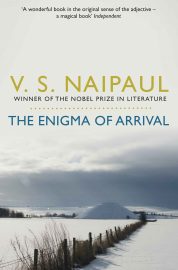Nobel prize winning author V. S. Naipaul passed away last week. It was interesting to read the obituaries and comments that followed, which mainly fell in two categories. People in the first category praised his writing but ignored his flaws while those in the second category declared that his flaws were so glaring (they were!) that as a result we should banish him to Dante’s Purgatory and forget all about his writing.
As we shall see, both these approaches are problematic if we generalize them. I must also mention that there were a few articles with a balanced view, consisting of both praise and criticism as required.
So the question really is the one asked in the title of this article. Can we separate the art and the artist? This is by no means a new question, people have been pondering over it for quite some time. It’s just that with the emergence of the #MeToo movement, too many celebrities have been accused of sexual harassment and we are forced to revisit this question with far more regularity than we would like to.
Usually, I dump such questions under the label of Unsolvable Problems. What this means is that I cannot decide one way or another. Both sides raise valid points. Other questions in this category include capital punishment, legalising abortions and mercy killing and last but not the least, in a supermarket, “which line is moving faster?”
In order to see how difficult this problem is, let us take two examples. Jerry Seinfeld was asked about the famous comedian Bill Cosby on the The Late Night Show with Stephen Colbert. Bill has been accused of rape and sexual harassment. In this video – the relevant part starts at 6:00 – Jerry first says that this does not affect him. He can still enjoy Bill’s comedy. But when they come back from the commercials, Jerry says that he has changed his mind. Now he cannot watch it. This is one of the many things I admire about Jerry Seinfeld. He is brutally honest. Have you ever heard anyone admitting on TV that they have changed their mind as a result of a discussion?
The second example is from the book Other Colours, written by the Nobel winning Turkish writer Orhan Pamuk. This is a collection of essays and one of them is on the French writer André Gide. Turkish intellectuals, Pamuk included, revered Gide. His writing style was widely emulated and his thoughts were followed in Turkey as if they were gospel. Unfortunately, this feeling was not reciprocated. When Gide visited Turkey, he recorded his thoughts in a journal. A sample quote will give you an idea, “The Turkish costume is the ugliest you can imagine, and the race, to tell the truth, deserves it.” He continues, “The very educative value that I derive from this trip is in proportion to my disgust for the country, I am glad not to like it more.”
So now Mr. Pamuk faces the same dilemma. Here’s a writer he admires who has unbelievably racist opinions about Turkey. What should he do? Here’s how Pamuk tries to solve the problem. He says, “I know I can best grasp Europe as a concept if I approach it with two contradictory thoughts in mind: first, the dislike that Gide felt for other civilisations – for my civilisation – and, second, the great admiration that Tapinar felt for Gide and through him all of Europe. I can only express what Europe means to me if I fuse the contempt with admiration, the hate with the love, the revulsion with the attraction.” So basically what he is saying is: accept Gide as he is. By the way, Tapinar was another famous Turkish writer who also idolised Gide.
This may be useful in cases where the artists have problematic views but they have not done anything criminal. Naipaul probably falls into this category but what about Winston Churchill? The disgust that Churchill felt for Indians was as intense as that of Gide but its implications were far greater because of the power that Churchill held. He did not send help to India during the Bengal famine in 1943 and as a result, millions of Indians died. Now there is no way I can reconcile this as Mr Pamuk suggests. While Churchill’s grit and leadership during WWII cannot be ignored, his views on humanity sound to me as nothing but sheer hypocrisy.
About 800 words in and we are getting nowhere so let us try a different approach. In mathematics, when you want to see how a function behaves, you test it at extreme points, like zero and infinity. Let us take the hypothesis that the artist and her art are inseparable, apply it to every artist and see what happens.
Well, the first thing that will happen is we will have to do away with many, many artists. For starters, most of the old British authors were racists to various degrees and supportive of the Empire. Bye-bye Rudyard Kipling and the Jungle Book. My favourite author Sir Arthur Conan Doyle used to go whaling in the Arctic seas and as a result of this irresponsible behaviour, whales are an endangered species today. So no more Sherlock Holmes. No game is afoot.
Do you like Alice in Wonderland? Lewis Carol, its author, used to photograph naked female children and it is strongly suspected that he was in love with the under age girl on whom Alice in Wonderland is based. Last but not least, Albert Einstein’s diaries reveal shocking xenophobia when he visited China. He says, among other things, “It would be a pity if these Chinese were to supplant all other races. For the likes of us the mere thought is unspeakably dreary.” After reading this, I am not sure how I should respond to Einstein’s quotes on humanity that are often shared on social media.
You may notice that there are no women in this list or the famous #MeToo list. The reason is quite simple. Hundreds of years of patriarchy kept women suppressed in every area. They did not have power. And any kind of harassment or bullying is always about power. This is perhaps not a very popular thing to say today, but women can be as petty, narcissistic and prone to abuse power as any man. Recently, Prof. Avital Ronell, who is a well known researcher of German and comparative literature, was accused of sexually harassing her male PhD student. Even more shockingly, Asia Argento, the actress who was the first to come out against Harvey Weinstein, sexually harassed her underage male co-star. Notice here that Asia abused her younger co-star, over whom she had control. She could not have done it with a powerful Hollywood superstar. Harassment is unidirectional – from the powerful to the powerless.
It is telling that compared to the male abusers of the #MeToo movement, these two stories received very little attention. As more women assume power, the number of corrupt women will also increase. To achieve equality in the true sense of the word, feminism needs to come up with a proper response to cases like these where one of their own is in the wrong.
If we apply the hypothesis that art and the artist are inseparable to other areas of life, we encounter more problems. Here’s an example of what I like to call ‘the cancer cure paradox.’
Imagine that there is this brilliant professor who discovers a cure for cancer. Many lives are saved and he gets a well deserved Nobel. But then, a hidden side emerges. The professor is a drug lord in secret life, just like Walter White in Breaking Bad. He has murdered many people and committed various felonies. He is convicted and sent to jail.
Now, what do we do about his cancer cure? The practical thing to do would be to continue to use it and save lives. But then you just agreed that a creative person and his creation can, in fact, be separated. And if you don’t use the cure, millions will die unnecessarily simply because you could not agree to bend your principle a little.
These are some of the vicious circles that I get into while thinking about this problem. And I have already mentioned that I do not have a solution. The only line that I can draw is perhaps a criminal act. So when I read in Pablo Neruda’s autobiography that he once raped a native woman, his poetry lost all its meaning for me. I think there should be a degree of responses to such problems. A person who has racist opinions is not as guilty as a person who has murdered someone because of racist attitudes. There are degrees of offenses and the responses should be proportionate.
Finally, my thoughts on Naipaul.
First of all, if you don’t like him, good for you. I, for one, am not going to try to convince you that you have to like him (you don’t) because he’s the best (he is not). I don’t understand why people get so upset if someone likes a different movie or book than they do. And this is followed by shaming or mocking other people’s tastes. Our artistic tastes are a result of millions of experiences through billions of neuronal connections. Everyone has a unique taste. Let it be that way.
I cringe when I hear Naipaul talking about women or colonies like Africa. His travelogues contain keen observations but I cannot take the derisive tone and “corrugated iron.” In one of the books I read, almost every building or structure had “corrugated iron” in it.
What I really like are his earlier books like The Mimic Men and a later one in particular, The Enigma of Arrival.
The Enigma of Arrival is neither a fiction nor a nonfiction. It is not a travelogue. It is a strange mixture that is part autobiographical, part analytical. Naipaul explores the English countryside through the lenses of history, art, language and literature. Mixed with this are his deep feelings of rootlessness, longing and a desire to find closure. Closure about his roots that extend to the Caribbean and beyond, to India. He has made himself at home in England but this always feels like ‘a home away from home.’
The magic that he weaves with simple words is exquisite. He is a magician of words who can make the Taj Mahal appear in the middle of Pacific Ocean, make you nostalgic about a past that you have never experienced, make you feel the longing that cannot be put into words and yet – this inability itself is expressed through words.
It is at such moments that you realize why he is called one of the finest writers of 20th century.


